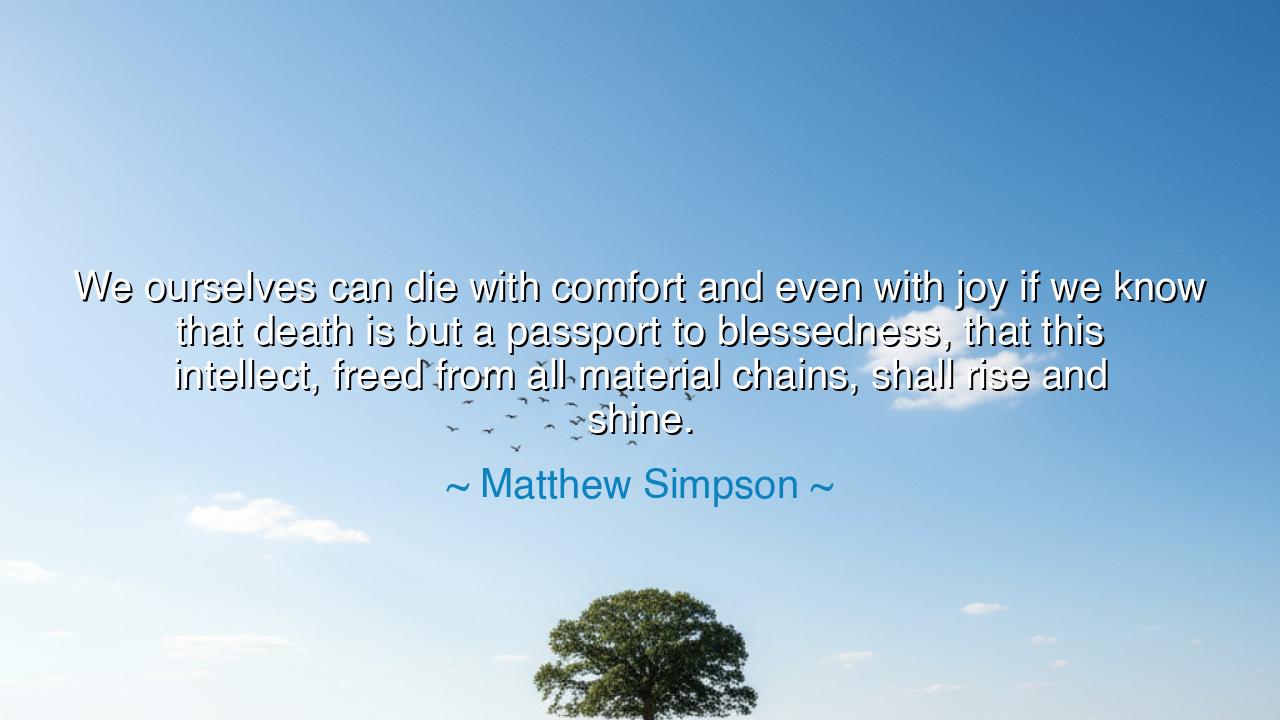
We ourselves can die with comfort and even with joy if we know
We ourselves can die with comfort and even with joy if we know that death is but a passport to blessedness, that this intellect, freed from all material chains, shall rise and shine.






“We ourselves can die with comfort and even with joy if we know that death is but a passport to blessedness, that this intellect, freed from all material chains, shall rise and shine.” Thus spoke Matthew Simpson, the orator and bishop of the 19th century, a man whose words once thundered across pulpits with the solemn grace of eternity. In this utterance, he gives voice to one of the oldest and holiest of human hopes—that death, which so many fear as an end, is in truth a beginning, a sacred transition from the shadowed valley of mortality into the light of the eternal. Simpson’s vision is not one of despair, but of liberation; not of endings, but of ascension.
He belonged to an age of faith, yet also of reason—a time when science began to unravel the mysteries of the physical world, and men wrestled with the boundaries of spirit and matter. Amid such tensions, Simpson’s words stand as a bridge between the two realms. He calls death not an annihilation, but a passport, a passage authorized by the hand of the divine. To him, the soul is no prisoner of flesh forever—it is a traveler, and when the journey of the body ends, the intellect, purified and unchained, continues onward into the infinite. There, freed from pain, corruption, and confusion, it shall rise and shine—a star returned to its rightful heaven.
The ancients, too, saw glimpses of this truth. The philosopher Plato taught that the body is but the tomb of the soul, and that wisdom is the art of learning how to die well—to free the spirit from its earthly fetters. The Stoics accepted death as nature’s decree, greeting it not with sorrow but with reverence. And the Christians, in whose faith Simpson was steeped, believed that death was the veil between time and eternity, that beyond it waits not darkness, but divine blessedness. In all these teachings, the same eternal melody resounds: the soul is immortal, and the end of life is but the beginning of truth.
Consider the death of Socrates, who, condemned to drink poison, comforted his weeping disciples with calm assurance. “To die,” he said, “is either to sleep without dreams, or to journey to another place where all the great souls dwell.” He drank the cup without fear, for he saw death as a release, not a ruin. In that moment, his intellect was already shining—freed from the weight of the world, lifted into the clarity of the eternal. Socrates embodied the same conviction that Simpson voiced centuries later: that death is not defeat but deliverance, the soul’s homecoming to its own divine source.
To die with comfort and even with joy, then, is not a denial of grief but a triumph of faith. It is the realization that the soul’s true life is not bounded by breath or flesh. When we understand that the intellect, the spirit of consciousness and reason within us, is not extinguished by the grave but transformed by it, then death loses its sting. We see that the material chains which once bound us—fear, pain, ambition, pride—fall away, leaving only the essence of what we are: pure awareness, pure love, pure light. In this way, to accept death is to awaken to immortality.
The meaning of Simpson’s quote is both comforting and courageous. He teaches that if we live rightly—if we cultivate virtue, wisdom, and reverence—then death need not be dreaded. Instead, it becomes an honored passage, a final act of release into a greater existence. The one who understands this truth does not clutch at life in terror, nor waste it in vanity. He lives with purpose, knowing that every thought and deed prepares the soul for its rising. For the passport to blessedness is stamped not at the hour of death, but through a lifetime of goodness and growth.
The lesson, my listeners, is clear: do not fear death—prepare for it by living well. Seek not immortality through monuments or memory, but through the cultivation of the eternal within you. Each act of love, each pursuit of truth, each moment of compassion polishes the mirror of your soul, so that when the final hour comes, you may reflect the divine light without shadow. Live so that you may die without regret, knowing, as Simpson wrote, that your intellect shall indeed rise and shine—freed, at last, from all earthly bonds.
So, when the night of life deepens and the final breath nears, remember these words: death is not darkness, but dawn. The spirit that has walked in goodness will awaken to a greater radiance. Let your heart, then, be untroubled. For nothing true, nothing pure, nothing God-like ever perishes. The body sleeps; the soul journeys on. And beyond the veil, it rises—not as dust scattered to the wind, but as a flame rekindled in the halls of eternity.






AAdministratorAdministrator
Welcome, honored guests. Please leave a comment, we will respond soon